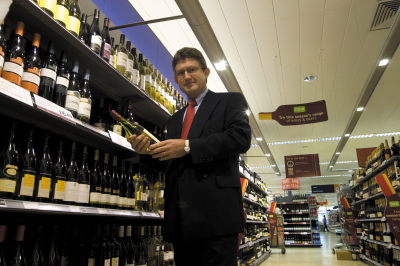Save our cornershops!

Professor Ian Clarke
Britain’s corner shops are disappearing at a rate of 2000 a year: that’s more than five a day, according to a new all party parliamentary report (to be published at the end of January 2006). Urgent action is required if one of Britain’s great institutions is to be saved, says a leading academic.
Ian Clarke, a Professor of Marketing at Lancaster University Management School and Senior Fellow of the UK Advanced Institute of Management Research (AIM), has spent three years researching the UK grocery sector. He believes that the new report by the All-Party Small Shops Group does not go far enough. “The rate of small store closure is not a new phenomena – it has been going on for decades”, he says. “What is new is the recognition that the rate of closures of small independent shops is directly linked to the growth of supermarkets”.
Professor Clarke, who is currently leading a major AIM research project and previously led a three-year ESRC-funded study, argues that to save our corner stores, the UK’s regulatory authorities need to take drastic action in four areas:
1. There should be an immediate embargo on acquisitions of small store chains by the supermarkets.
2. The two-market definition currently used by competition authorities – “convenience” and “one-stop” -- which allows supermarkets to buy up convenience stores unchallenged should be overhauled.
3. Consumer choice should be measured on the ground locally, to understand what consumers actually want, and makes them satisfied.
4. The way we understand consumer choice should be widened – beyond simply having access to the major supermarkets.
The massive expansion of the major supermarkets over the last 20-30 years, coupled with their huge market shares and buying power has brought ever-more superstores within our reach as consumers -- a pattern repeated right across the UK. However, the main casualty of this trend is the small independent store sector.
“The major supermarket operators are well aware of the effect they are having in this respect”, says Professor Clarke. “But they are reluctant to admit it. Instead, they tell us they need to expand to be ‘more competitive’. They are putting the corner shop at risk under the guise of ‘giving the customer what they want’”.
“Supermarket chains like Tesco, Asda and Sainsbury compete among themselves for the benefit of the consumer -- by bringing down prices and expanding choice”, adds Professor Clarke. “But if they are also pushing independent local shops out of business you have to ask if that is really in consumers’ best interests.”
He argues that the competition authorities have to start asking a different question – what is competition really for?”
“If it is to increase choice, then let’s start evaluating choice at the really local level as the UK Competition Commission suggested in its report on supermarkets in 2000 – the level at which we live our lives. The type of question we need to be asking is, does having several stores in a given locality, all owned by the same chain mean adequate choice for the consumer? Or does it mean having all the major supermarket chains accessible? Or having large stores and a healthy variety of smaller stores? Our previous research tells us is that it is the latter. This is a wake-up call”.
Professor Clarke’s research shows that consumers are shopping more frequently, blurring the boundaries between ‘convenience’ and ‘one-stop’ shops – which is critical, because regulators in the UK consider these to be two different markets rather than one. Not recognising this fact, he says, is allowing the major supermarkets to expand their small store formats through acquisitions of chains and new store building. “But the research shows that people want genuine diversity at the local level to be sustained through support of the independent store sector.”
Professor Clarke hopes his current AIM-sponsored study will help inform this debate, using fieldwork across the country to develop a method to measure the effect of different levels of local retail provision and what this means for consumer satisfaction.
“When the results are out later in 2006, we’ll have a much clearer idea of what levels of supermarket provision customers regard as ‘adequate’, ‘good’ and ‘excessive’, and how this understanding can be used to guide and regulate the sector”, he adds. “Given the parlous state of the UK independent store sector, it behoves us to take evidence on board.”